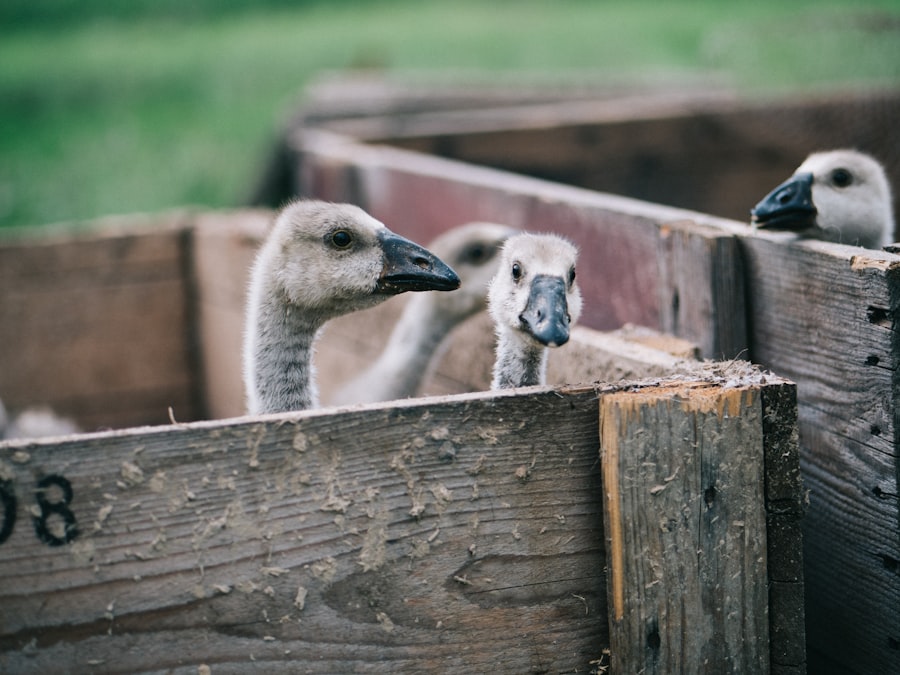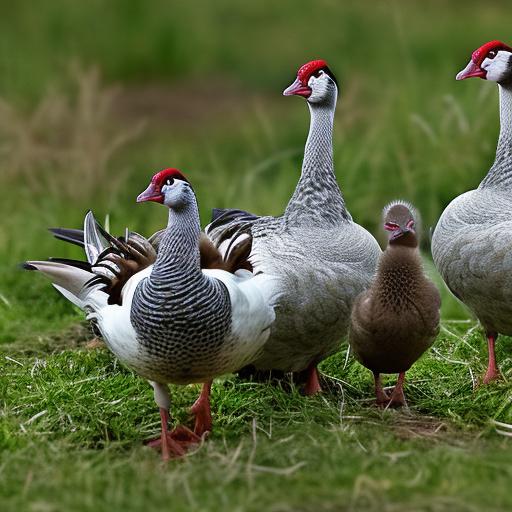Keeping geese and chickens together is a popular trend among backyard farmers. It offers a range of benefits, including natural pest control, increased egg production, companionship, and entertainment. Raising geese and chickens together can also provide fertilizer for your garden. In this article, we will explore the benefits of this practice, how to choose the right breeds for your flock, housing requirements, feeding and watering needs, health considerations, managing flock dynamics, egg production and collection, protecting your flock from predators, and the joys and challenges of raising geese and chickens together.
Key Takeaways
- Keeping geese and chickens together is possible and can be beneficial.
- Raising geese and chickens together can provide a variety of benefits, including pest control and increased egg production.
- Choosing the right breeds for your mixed flock is important to ensure compatibility and optimal egg production.
- Housing requirements for geese and chickens differ, but can be accommodated with proper planning and design.
- Feeding and watering your mixed flock requires attention to the different dietary needs of geese and chickens.
Benefits of Raising Geese and Chickens Together
One of the main benefits of keeping geese and chickens together is natural pest control. Geese are excellent grazers and will eat a variety of insects, including ticks, fleas, and grasshoppers. They can help keep your yard free from pests without the need for chemical pesticides. Additionally, geese have a strong instinct to protect their territory and will alert the flock to any potential threats.
Another benefit is increased egg production. Geese are known for their large eggs, while chickens are known for their consistent egg-laying abilities. By keeping both geese and chickens together, you can enjoy a variety of eggs in different sizes. This can be especially beneficial if you sell eggs or use them for baking.
Companionship and entertainment are also important benefits of raising geese and chickens together. Geese are social animals that enjoy the company of other birds. They can form strong bonds with their chicken counterparts and provide companionship for each other. Additionally, watching the interactions between geese and chickens can be highly entertaining.
Lastly, raising geese and chickens together can provide fertilizer for your garden. Both geese and chickens produce manure that can be used as a natural fertilizer. This can help improve the quality of your soil and promote healthy plant growth.
Choosing the Right Breeds for Your Flock
When choosing breeds for your mixed flock, there are several factors to consider. First, you’ll want to consider the size and temperament of the birds. Geese are generally larger and more aggressive than chickens, so it’s important to choose chicken breeds that can hold their own. Some chicken breeds that work well with geese include Rhode Island Reds, Plymouth Rocks, and Sussex.
It’s also important to consider the climate in which you live. Some breeds are better suited to cold climates, while others thrive in warmer climates. Research the specific needs of each breed before making your decision.
When it comes to finding quality breeds, there are several options available. You can purchase chicks or adult birds from local breeders or hatcheries. It’s important to choose reputable sources that prioritize the health and well-being of their birds. You can also consider adopting birds from rescue organizations or local farms.
Housing Requirements for Geese and Chickens
Providing appropriate housing for your geese and chickens is essential for their health and well-being. Both geese and chickens require a coop and run area that is secure, spacious, and comfortable.
The coop should be well-ventilated and provide protection from predators. It should also have nesting boxes for the chickens to lay their eggs and roosts for both geese and chickens to sleep on. The coop should be cleaned regularly to prevent the buildup of waste and parasites.
The run area should be fenced in to prevent escape and protect the birds from predators. It should also provide ample space for the birds to roam and graze. Consider adding a small pond or water feature for the geese to enjoy.
Feeding and Watering Your Mixed Flock
Geese and chickens have different nutritional needs, so it’s important to provide them with appropriate feed. Geese require a diet that is higher in protein and lower in calcium compared to chickens. You can find specialized feeds for geese and chickens at your local feed store or online.
Feeding schedules and options will depend on the age and breed of your birds. Chicks and goslings will require a starter feed, while adult birds can be transitioned to a grower or layer feed. It’s important to provide fresh water at all times, as both geese and chickens require access to clean drinking water.
Health Considerations for Geese and Chickens

Like any animals, geese and chickens are susceptible to certain health issues. It’s important to take preventative measures to keep your flock healthy. This includes providing a clean and sanitary living environment, regular veterinary check-ups, and a balanced diet.
Common health issues in geese include respiratory infections, parasites, and foot problems. In chickens, common health issues include respiratory infections, mites or lice infestations, and egg-laying problems. It’s important to monitor your birds for any signs of illness, such as lethargy, loss of appetite, or changes in behavior.
If you notice any signs of illness in your birds, it’s important to consult a veterinarian who specializes in poultry health. They can provide a proper diagnosis and recommend appropriate treatment options.
Managing Flock Dynamics and Pecking Order
When introducing new birds to an existing flock, it’s important to understand the pecking order. Geese and chickens have a hierarchical social structure, with dominant individuals asserting their authority over subordinate individuals. This can result in pecking or aggressive behavior.
To minimize conflicts, it’s important to introduce new birds gradually and provide plenty of space for each bird to establish their territory. It can also be helpful to provide distractions, such as toys or treats, to redirect any aggressive behavior.
Egg Production and Collection from Mixed Flocks
One challenge of raising geese and chickens together is determining which bird laid which egg. Geese and chickens have different egg sizes and colors, which can help you identify the source of each egg. Geese lay larger eggs with a white or cream-colored shell, while chickens lay smaller eggs in a variety of colors.
To maximize egg production, it’s important to provide a comfortable and stress-free environment for your birds. This includes providing appropriate nesting boxes, clean bedding, and a balanced diet. Collecting and storing eggs should be done regularly to prevent spoilage.
Protecting Your Flock from Predators
Predators can pose a threat to your geese and chickens, so it’s important to take measures to protect your flock. Common predators include raccoons, foxes, coyotes, and birds of prey.
To deter predators, make sure your coop and run area are secure and free from any gaps or holes. Use sturdy fencing materials that cannot be easily breached. Consider installing motion-activated lights or alarms to scare away potential predators.
The Joys and Challenges of Raising Geese and Chickens Together
Raising geese and chickens together can be a rewarding experience for backyard farmers. The benefits include natural pest control, increased egg production, companionship, and entertainment. However, there are also challenges to consider, such as managing flock dynamics and protecting your flock from predators.
If you’re considering raising geese and chickens together, take the time to research the specific needs of each breed and provide appropriate housing, feeding, and healthcare. With proper care and attention, you can enjoy the joys of raising geese and chickens together in your backyard farm.
If you’re considering keeping geese and chickens together, you may be interested in an article on Poultry Wizard that discusses the importance of the size of your chicken coop door. Having a properly sized door is crucial when housing different poultry species together, as it allows for easy movement and prevents any potential conflicts. To learn more about this topic, check out the article on chicken coop door size. Additionally, if you’re looking for inspiration on designing a coop that accommodates both geese and chickens, Poultry Wizard offers another informative article on the Hannah Montana chicken coop. Lastly, if you’re wondering how many chickens you need to sustain a family of four, Poultry Wizard has got you covered with their article on the ideal number of chickens for a family of four.
FAQs
What are the benefits of keeping geese and chickens together?
Keeping geese and chickens together can provide several benefits, such as increased protection against predators, improved soil quality, and reduced pest populations.
What are some considerations when keeping geese and chickens together?
Some considerations when keeping geese and chickens together include providing adequate space, ensuring proper nutrition, and monitoring for any aggressive behavior.
Can geese and chickens share the same coop?
While geese and chickens can share the same coop, it is important to provide enough space for both species and to ensure that the coop is properly ventilated.
What should I feed my geese and chickens?
Geese and chickens have different nutritional needs, so it is important to provide them with separate feeders and to feed them appropriate diets. Geese require more protein and less calcium than chickens.
Do geese and chickens get along?
Geese and chickens can get along, but it is important to introduce them slowly and monitor their behavior. Aggressive behavior can occur, especially during mating season.
What are some common health issues for geese and chickens?
Common health issues for geese and chickens include respiratory infections, parasites, and egg-laying problems. It is important to provide regular veterinary care and to maintain a clean living environment.
Meet Walter, the feathered-friend fanatic of Florida! Nestled in the sunshine state, Walter struts through life with his feathered companions, clucking his way to happiness. With a coop that’s fancier than a five-star hotel, he’s the Don Juan of the chicken world. When he’s not teaching his hens to do the cha-cha, you’ll find him in a heated debate with his prized rooster, Sir Clucks-a-Lot. Walter’s poultry passion is no yolk; he’s the sunny-side-up guy you never knew you needed in your flock of friends!







